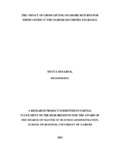| dc.description.abstract | This study sought to examine how cross-listing affects the share returns of cross-listed
at the Nairobi Securities Exchange. The research design adopted in this study was the
experimental research design. The population was 64 listed companies in Kenya from
which 16 firms were sampled out with 8 of the firms being cross-listed ones. The final
sample consisted of 14 firms after one cross-listed firm was dropped for lack of data.
This study used secondary data obtained from the NSE Secretariat. Specifically, data
was gathered on annual share prices of firms selected for the study for an 8-year
period (3 years before and 5 years after the cross-listed firms did so), the total assets,
and the NSE 20 share index. The study used descriptive analysis and ANOVA test of
differences. The study found that there were no statistically significant differences
between the abnormal returns of cross-listed stocks and no-cross-listed stocks. The
study concludes that cross-listing does not lead to better performance of cross-listed
stocks and neither does it hurt the rival firms. The study recommends that firms in
Kenya need to vet the markets in which they seek to cross-list on in terms of their
reputation vis-à-vis the local stock exchange before they cross-list as the current East
African markets do not offer any premium. | en_US |

